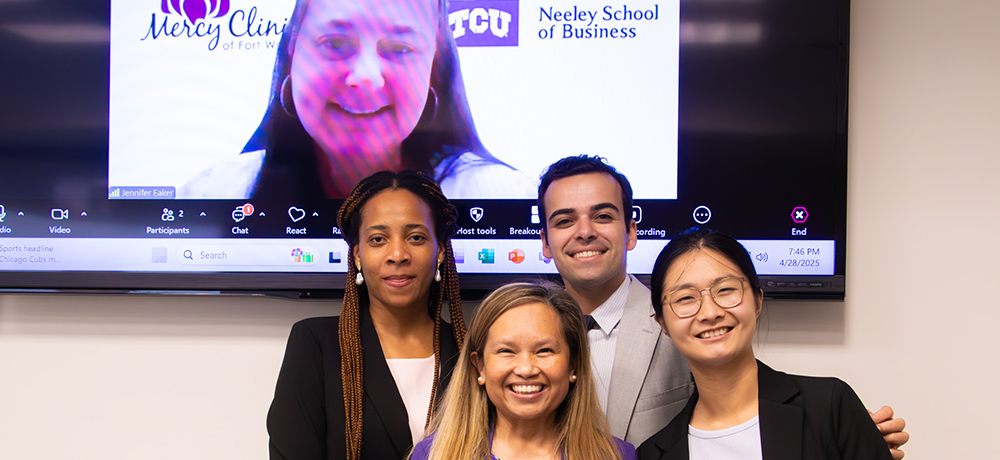MBA students blend business strategy and medical insights to expand free healthcare at Mercy Clinic for targeted Forth Worth community.
May 27, 2025
By Kelly Kjetsaa
A semester-long consulting project brought graduate students from various Neeley MBA programs together to provide Mercy Clinic of Fort Worth with recommendations for marketing through storytelling and financial growth opportunities.
Zain Ali, an associate professor of professional practice in the Neeley School of Business, connected graduate students – many with health care knowledge - to Mercy Clinic, a nonprofit faith-based health center serving uninsured adults in Fort Worth. The project served as a smaller-scale version of the Neeley & Associates Consulting program and marked the school’s first fully online experiential learning class.

Ten students were split into two teams focused on storytelling and finance. A beneficial aspect was the incorporation of graduate students involved in TCU’s Burnett School of Medicine and students currently working in the health care industry. The goal for the two teams - help Mercy Clinic increase capacity, expand fundraising and better serve patients in the three high-need ZIP codes the clinic serves.
“Students are more passionate about service and community projects than other experiential learning classes I’ve taught,” said Ali. “They showed up with genuine interest and delivered real value.”
Ali said the digital format mirrored how many companies operate in hybrid environments, making collaboration with clinic leaders easier. The project also supported TCU’s focus on student scholarship, research and community impact through hands-on learning.
Storytelling for Impact
One student team focused on data-driven storytelling, developing patient personas to reflect Mercy’s client base. With limited internal data, the team supplemented information with U.S. Census and Center for Disease Control sources to create four representative profiles that highlighted key barriers to care.
“This project showed me how to use data and storytelling to help inform and solve a problem,” said Maricar Estrella Hastings, a professional MBA student and director of digital strategy for the Burnett School of Medicine. “We hope Mercy can use these personas to create better storytelling that attracts more patients, volunteers and donors.”
Ethan Vieira, M.D. brought firsthand insight to the work as a Burnett medical graduate, who also earned a health policy and management certificate from Neeley and has served as longtime Mercy Clinic volunteer.
“I wasn’t just consulting as an outsider; I understood the barriers patients face,” Vieira said. “We aimed to make Mercy Clinic’s invisible patients visible.”
Guiding Financial Growth
The second team focused on finance — analyzing clinic costs, identifying funding gaps and creating a model for future expansion. Their work will help Mercy evaluate grants, plan capital campaigns and build donor relationships.
“This collaboration gave us a different lens through which to talk about our mission and communicate our story,” said Shawn Powers, a member of the clinic’s board of directors.
“Mercy Clinic now has marketing collateral, donor strategy and a financial model they can actually use,” Ali added. “And our students gained confidence in applying what they’ve learned to serve a mission-driven organization. That’s a win on every level.”
A Model for Future Collaboration
The course also served as a model for future interdisciplinary work. Two professional MBA students had ties to the Burnett School of Medicine, and Ali said he hopes to explore similar partnerships with TCU Nursing. More than a class assignment, the collaboration gave students a chance to make a lasting impact — and helped Mercy Clinic gain tools to carry its mission forward.

